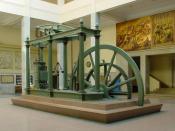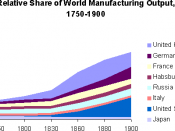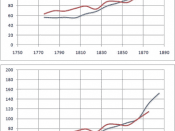Impacts and Consequences of the Industrial Revolution on Society (1700-1830) The initial stage of the Industrial Revolution took place in England from 1712-1830 and can be best described as, "the application of power driven machinery to manufacturing"�. It was brought about primarily by the invention of the steam engine and the developments of new technology for the textiles industry.
Prior to the advent of machinery Britain was primarily an agriculturally based country, most people worked on there own farms or as hands on nearby farms. The advent of industry saw many rural people moving to cities such as Liverpool and Manchester, for employment in the new factories. There were an abundance of jobs for the now exploding population. With this however came appalling working and living conditions, low wages and long hours.
As urbanisation began, houses were hastily erected; most had no proper sanitation and quickly became overcrowded with families and thus disease spread swiftly.
The factories packed in as many machines and operators as possible for maximum productivity. People often worked 14 hours a day. Woman and children as young as five years old were employed for the less skilled jobs, often the most dangerous, and many workers were injured or killed after getting caught up in the machines. Where they were previously working at there own pace they were now required to keep up with the machine.
The new working conditions brought the people of the working classes together. Where as before they had perhaps been working in smaller social groups on farms, they had now been herded together with others similar to themselves. This new interaction, it is believed, led to a fellowship amongst the workers giving them a class identity. This class consciousness coupled with the development in new trade unions for the factory workers, were...


